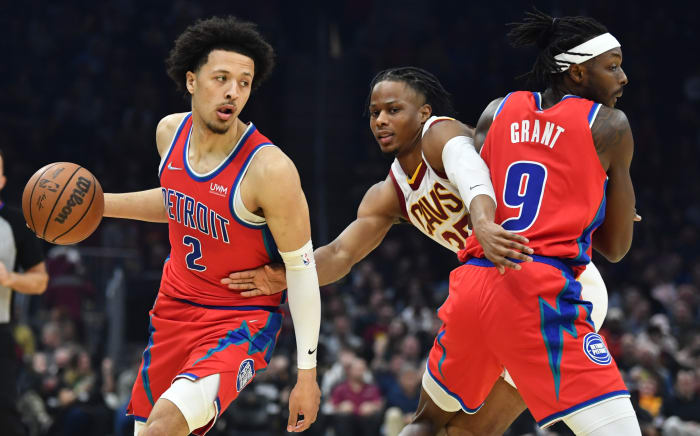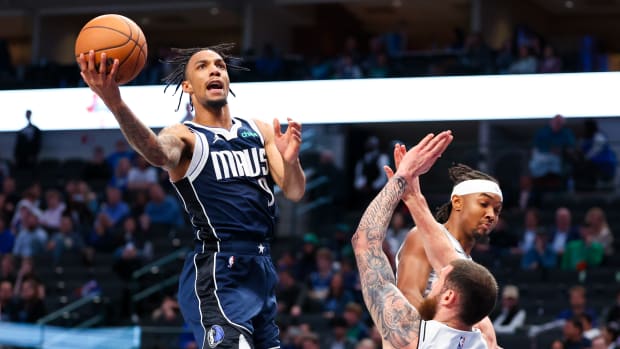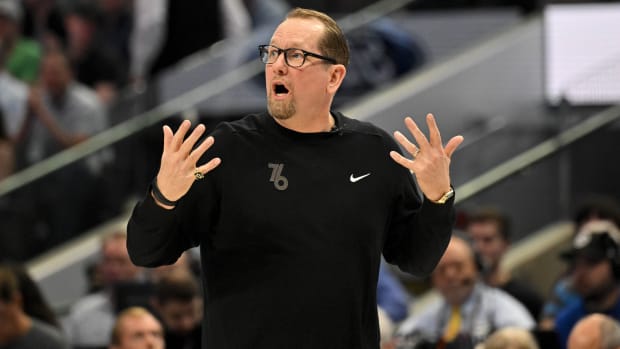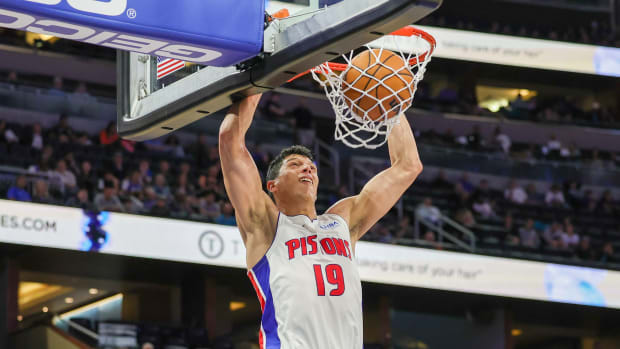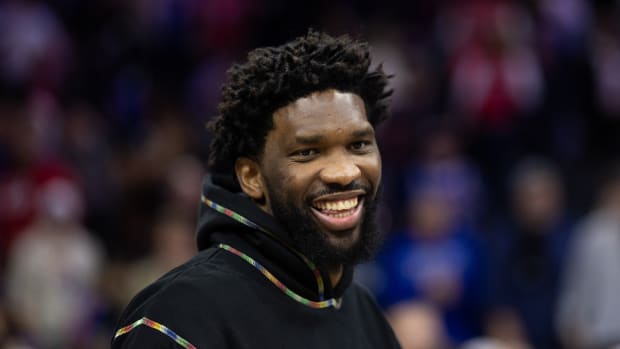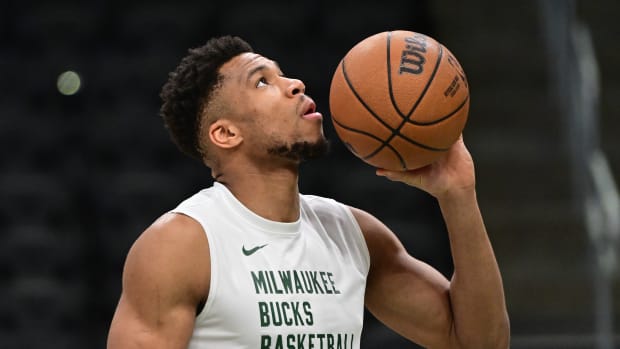On a Saturday afternoon in the middle of March, Cade Cunningham walks into a studio at the Detroit Pistons Performance Center and plops himself down in front of a big-screen television that has a Zoom call on display. As the first question streams from the monitor, Cunningham cuts it off mid-sentence: “I’m proud of that, man!”
The topic at hand isn’t his Rising Stars MVP trophy or Detroit’s recent (and only) three-game winning streak. Instead, the 2021 NBA draft’s No. 1 pick is grinning ear to ear about Wordle, a mega popular online game that requires participants to guess a secret five-letter word in six tries. A few weeks earlier, Cunningham posted one of his scores on Twitter. It was his fourth time playing and he needed only two tries to guess it right.
“I didn’t even know that people don’t really get those type of scores,” he beams. Having just wrapped up practice and a 30-minute post-practice lift, Cunningham is wearing a blue Pistons tank top over a black hoodie. He looks more refreshed than exhausted as his palms turn up with a shrug. “I thought it was pretty common to get in the second try.”
Comparing Cunningham’s ability to solve a puzzle with everything he does on the court is silly. At the same time, it’s a reminder of how difficult it can be to stump a rookie who acts and thinks like a 12-year veteran.
At 20 years old, Cunningham regularly flashes a command and understanding of basketball that only a select few in the NBA can. With physical gifts, intuition, competitive intensity and poise (which is the first word everyone interviewed for this story used to describe him), there’s no reason to believe Cunningham won’t eventually become a superstar. “I feel I have all the tools to be great,” he says. “It's just about ironing out all the little details and being consistent with it.”
And yet, a slow start combined with his team being on the wrong side of many a blowout has made Cunningham’s development—which is one of the league’s most meaningful long-term subplots—so easy to miss. A meticulous 6'6" point guard who sees things happen before they actually do, Cunningham was derailed by an ankle injury during the preseason that delayed his NBA debut until Detroit’s fourth game. It was forgettable, a two-point clunker against the Magic that preceded him shooting 6-for-31 over his next two games.
“Coming in, I mean, you daydream, and I’m trying to manifest all these things I’m gonna do in my first game and whatever, and it didn’t play out that way. … I never really got down on myself. I know how good I am, you know what I’m saying?” he says before admitting how strange it was to see such a harsh reaction to his first few games. “I didn't expect people to kind of write me off the way that they did.”
Poor play didn’t last very long. Cunningham was named Rookie of the Month in January, a stretch that was statistically less impressive than his December. The nascent rise that followed his initial growing pains as the central figure of Detroit’s rebuild—or “restoration” as Pistons general manager Troy Weaver prefers to label his plan for the storied franchise—has almost been evolutionary.
He isn’t perfect—Cade’s true shooting percentage is higher than rookie LeBron James, but he also ranks 61 out of 62 players who’ve taken at least 800 shots this season—and the Pistons are 20–55. But Cunningham inhabits a prescience that makes him seem like a new-age iteration of every two-way playmaking wing archetype from the past, as if most glitches and bugs in previous models were fixed by a system update. There are no glaring shortcomings when he steps on the floor. Cunningham scores, crashes the glass, handles the ball, defends multiple positions (on a team that switches a ton) and makes plays for others.
“This kid really doesn’t have any weaknesses,” says Weaver.
Not even 60 games into a career that can potentially bear double-digit All-Star appearances, he’s first among rookies in points (17.2), second in assists (5.6), fourth in rebounds (5.7) and second in steals (1.2). Since the All-Star break, those numbers are even more impressive (21.3 points, 6.5 boards and 6.7 assists) while the Pistons’ net rating is +5.9 when he plays and -10.7 when he sits—a team-best disparity. Cunningham also trails only Trae Young and Nikola Jokić in clutch points.
Instead of panicking when things don’t go as planned, he improvises with a cool that can’t be taught, particularly in the fourth quarter. Down the stretch of a January game in Milwaukee that was his first back from health and safety protocols, Cunningham drilled a late three over Giannis Antetokounmpo and then put back his own miss for a clinching and-one. “I was like, ‘Wow,’” Weaver says. “To come in here, first game after COVID and to be as fearless against this team, it really showed: This guy, he’s for real.”
Another example came in a March win against the Hawks, when Cunningham muscled through contact for a critical bucket, seconds after his own shot was blocked and he short-armed a reverse layup on the same play.
Nights like these have convinced Pistons head coach Dwane Casey that Cunningham has “it”—that ever-indescribable hallmark that transcends statistical analysis. “He could play like I don’t know what in the first three quarters, but then when it’s crunch time, he would always make the play,” Casey says. “That’s the common denominator he has with the [Dirk] Nowitzkis and [Kevin] Garnetts and the Gary Paytons, the Ray Allens, all the guys that I’ve been associated with in the past.”
Cunningham entered the NBA equipped with every skill and trait—versatility, length, aplomb, etc.—that’s required to thrive. Unleashed altogether, what the Pistons have is a foundational bedrock, nightly triple-double threat and one-way ticket to the success and relevance that’s eluded them for so long. The question of whether Cunningham can be great is no longer worth asking. Now, it’s how great can he be?
Weaver has a knack for identifying superstars before they blossom. More than two decades ago, as an assistant coach at Syracuse University, he kept his eye on a 6'1" high school freshman named Carmelo Anthony who committed to the school a couple of years later. Leading up to the 2008 NBA draft, he was the loudest proponent for Russell Westbrook in Seattle’s front office, when very few expected him to go that high.
Weaver remembers the exact moment he realized Cunningham was truly special, scouting him as a 17-year-old at Montverde Academy. “He got a long rebound on the baseline. And it was a hit ahead, like a no-dribble hit ahead to the kid [Moses] Moody,” Weaver says. “[A] full-length outlet pass. It was an incredible play. … It’s pretty rare to have that size and that length and incredible hands. And the mental capacity to go with it? You don’t see it often. And when you see it, it sticks out like a sore thumb.”
When everything he brings to the table is considered, those who are around Cunningham every day struggle to name players he reminds them of. Grant Hill is a neat parallel, given their size, grace and composure. It’s the first name that eventually pops into Casey’s head.
But Weaver, who grew up around where Hill played in high school and is intimately familiar with his game, doesn’t necessarily think the former Pistons franchise player is the right comparison. Maybe there is no answer. Weaver can’t remember ever seeing someone this well rounded at such a young age. Instead, he returns to Cunningham’s intellect, musing about the time he watched Cade score two points in a high school game and still flourish as the best player on the floor.
“Larry Bird was incredible with his mind. He was just able to play ahead of everybody because of his mentality, and Cade has some of that,” Weaver says. “I think in time Cade’s mind will allow him to always be a couple steps ahead. … If he ever reaches Larry Bird’s status, it’s over.”
A couple of weeks ago, on a flight after a game, Cunningham was scrolling through Instagram when he saw a clip of Bird. (“Somebody posted something, and I was like, 'Damn!'”) He searched for more footage on YouTube and noticed some of the more timeless similarities between him and an all-time great who retired nine years before Cade was born. “I watch a lot of highlights of guys, just to see what their bag was like. … I really like that comparison because, I mean, Larry Bird is …” Cunningham says, shaking his head. “I feel like Larry Bird is one of the greats, and he’s still almost underrated.”
Cunningham grew up not wanting to be somebody else or model his entire game after another’s. Instead he watched bigger guards and point forwards, such as Jason Kidd, Hill and Tracy McGrady, who influenced the game in various ways, then tried to adopt what they did well. In that way, Cunningham is innovative with a taste for tradition. He has a bunch of different people’s skill sets,” Pistons forward Jerami Grant says. “Then his own.”
Cunningham has an ocean to cross before he’s an iconic three-time MVP, but the foundational tracks for that type of outcome are detectable in how willing and able he is to make adjustments. For instance, Pistons coaches have stressed the need for Cunningham, who averages more drives per game than any other rookie, to play off two feet when he gets into the paint. “Instead of trying to outjump an Anthony Davis,” Casey says, “if you go in there and come to a jump stop and use your free foot to either pass it out or pump-fake and get to the free throw line … you have a lot of options and then you can pivot around and get out of trouble.”
Now that he’s starting to do that more and more, Cunningham’s decision-making can be breathtaking. Of late, his pick-and-rolls might as well unfold on a soundstage, where every actor moves on cue until the director yells cut. He’s aware of the entire scene, knowing when to be patient or aggressive, pruning myriad options provided by his panoramic view down to one and then acting in the blink of an eye. A fast game slows down in these spots, whether he’s just put a defender in jail and is waiting for his screener to pick his own man out of the way for a layup, or careening downhill at full speed to set up a pinpoint kickout.
One of countless examples came against the Celtics on March 11, during a first half in which he logged 18 points, four rebounds and four assists in 21 minutes. Racing into a quick pick-and-roll with Marvin Bagley III, Cunningham’s momentum was interrupted by Al Horford, who switched out at the right elbow. The whole time Cade’s eyes locked in on Jayson Tatum, his own initial defender, who incorrectly took one step toward the diving Bagley (who was covered by Grant Williams’s rotation from the weakside corner) before he turned to run at Pistons wing Jamorko Pickett, all alone where Williams had left him.
Most 20-year-olds would attack Horford off the bounce, shoot over the top or, with no obvious advantage and 17 seconds still on the shot clock, pull it back out and maybe play off another ball screen. Cunningham isn’t most 20-year-olds. He leans back with a hang dribble, brings the ball over his head and snaps a dart to Pickett, who has just enough time to catch, rise and release before Tatum’s outstretched fingertips can get there. In four seconds, Cunningham analyzed the NBA’s best defense and took advantage of an almost imperceptible error before he threw a pass that, if not so exquisite, could not have generated three points for Detroit’s offense.
Cunningham doesn’t predetermine his disposition, but so often he plays as if holding a crystal ball in one hand and a button that can freeze time in the other. He loves dribbling off a screen, surveying the floor and reacting instantaneously to what his opponents have done (or are about to do), with enough size and athleticism to execute whatever his brain commands.
“I just see what the defense gives me and then try to play,” he says, walking through his step-by-step memory of that possession. “I’ve been blessed to have coaches before that have spammed pick-and-rolls for me, so I feel like I’ve been making some of these reads for a while; a lot of this stuff is just me being able to get back comfortable and play as free as I was used to. Early in the season it was just different. I was getting acclimated to my teammates, the game, the NBA. In my first days back playing basketball, [I was] in my head. I just had so many things racing in my mind. I didn’t allow myself to just play free.”
Having already established an ability to make just about every pass there is, simultaneously elevating teammates while grounding his team’s offense, the inevitable progress Cunningham makes as a scorer will certify him as one of the most formidable weapons in the sport. Efficiency is a formality. He is crafty around the basket, can create space in the midrange (especially pulling up from the right elbow) and has solid form with a quick release from deep (he made 40% of his threes as a freshman at Oklahoma State). When afforded an opportunity to show them off, Cunningham displays sophisticated post moves and is graceful finishing with either hand. As the Pistons surround him with more shooting—they rank 29th in three-point percentage—his life on the court will be more trouble-free.
“Since I’ve been in the NBA, I still haven’t been able to string together games where I feel I’ve played a great floor game on both sides,” Cunningham says. “I’m excited to see where I get.”
On the way there, Cunningham believes his 220-pound body will still fill out, something the personal chef he recently hired can help with. (He maintains a vegan diet.) Carrying himself as if he belongs has not been a problem, either. Cunningham is long for confidence. At last month’s All-Star Weekend, he offered a quick story to explain why. In seventh grade he attended a camp held by Rockets assistant coach John Lucas and learned an aphorism that burrowed deep inside his memory bank: Pros don’t take pictures with pros.
“I heard that, and it almost resonated with me, like, Hmmm, ‘Pros don’t take pictures with pros,’ he recalls. “I kind of walk around with that.”
Cunningham may not win Rookie of the Year, and if advanced stats are weighed heavily in the voting process he has little chance. Any case must instead rely on context. He leads all rookies in usage, with the highest percentage of his own baskets coming unassisted, on the NBA’s third-youngest roster that has zero players on it who’ve ever sniffed an All-Star appearance.
To boot, Detroit’s two best veterans (Grant and Kelly Olynyk) both missed lengthy stretches of the season with an injury. Compared to Evan Mobley, who has two All-Star teammates, or Scottie Barnes, who plays with an All-Star point guard and several others who won the championship three seasons ago, Cunningham has done more with less. As a testament to the attention he receives from opponents, Cunningham has more hockey assists than LeBron James while (just barely) averaging more per game than Luka Dončić or Trae Young did as rookies.
“This rookie class is tremendous,” Weaver acknowledges. “But none of them are shouldering the load like Cade. So that alone, to me, kinda puts him a cut above everyone else.”
When asked about the Rookie of the Year race, Cunningham downplays its gravity and heaps praise on the competition for how incredible they’ve looked since Day 1. He knows a trophy won’t make or break what he thinks about himself. For someone so goal oriented, who grasps the bigger picture, there are far more important things to worry about, such as what he wants to accomplish next season. “First, I want to be a playoff team, for sure,” Cunningham says. “I’d love to be an All-Star next year. I’d love to see somebody else from my team get in that conversation.”
The Pistons aren’t particularly close to winning a playoff series but have a couple of intriguing young players (especially Saddiq Bey, who scored 51 points two weeks ago), a ton of cap space to spend this summer and, as of this writing, a 52.1% chance to land a top-four pick in June’s draft. Cunningham can thrive in just about any system, and the virtuosity that makes him so special will look more significant when placed beside more accomplished and experienced players.
“As tough as it is to sit through some of these beatings that we take, I feel like it’s almost needed,” he says. “Kind of building our calluses up a little bit. It’s tough this year, but I’m excited for next year, years to come.”
Weaver’s goal is to surround Cunningham with two integral trademarks that extend beyond talent. “You look at great Piston teams; they had really good basketball IQ and they had toughness,” he says. “That’s what resonates here, and that’s how we’re gonna build a team. And Cade will be the linchpin of that.”
Since the season began, Weaver has constantly been in Cunningham’s ear about the need to master the fundamentals and stay in the moment. To Detroit’s 53-year-old architect, if Cunningham maintains both throughout his career, legitimate greatness will be on the horizon. “Tom Brady, Peyton Manning, Michael Jordan, Kobe Bryant, Derek Jeter, that’s what they all do,” Weaver says. “And if [Cade] can do those things, he’ll be one of those guys.”
Dreaming about the future is a nice distraction for Detroit, and Cunningham makes even the most unattainable goals seem realistic. This draws us back to the present, where, as the interview winds down, Cade’s competitive side emerges. When asked whether there are any illusions about him or his game that he’d like to correct, he leans forward and folds his arms across his knees. He’s smiling, but it’s tight, miles from when he was joking about Wordle.
“The NBA has a lot of fans, and there’s a ton of opinions out there. And so I kind of loosely know what’s being said about me, but more than anything I pay attention to my game and how I’m playing, how other people are playing, and I just use my own basketball knowledge to interpret what’s going on. I don’t really look into the opinions too much.
“But …” Cunningham looks off to the side and licks his lips before he stares a hole into the camera.“I feel like I’m the Rookie of the Year. I think that’s a misinterpretation that I’m not.”
More SI Daily Covers:
• Behind Ja Morant’s Sudden Ascent to NBA Superstardom
• Nikola Jokic Gets Lost Among the Stars. And He’s O.K. With That.
• LeBron Stole the Spotlight, But These Cavs Show Promise































